
in it from March to December, but after that time most of the fish
remove to some larger lake.
We remained two days, awaiting the return of some men who had
been sent to the Indian lodges for meat, and who were to go on with
us. Mr. Back and I did not need this rest, having completely
surmounted the pain occasioned by the snow-shoes. We dined twice
with Mr. Cameron, and received from him many useful suggestions
respecting our future operations. This gentleman having informed
us that provisions would, probably, be very scarce next spring in the
Athabasca department, in consequence of the sickness of the Indians
during the hunting season, undertook at my request to] cause a
supply of pemmican to be conveyed from the Saskatchawan to Isle a
la Crosse for our use during the winter, and I wrote to apprize
Dr. Richardson and Mr. Hood, that they would find it at the latter
post when they passed; and also to desire them to bring as much as
the canoes would stow from Cumberland.
The atmosphere was clear and cold during our stay ; observations
were obtained at the Hudson Bay Fort, lat. 54 16 10 N., long.
107° 29' 52" W., var. 22° 6' 35" E.
February 20.—Having been equipped with carioles, sledges, and
provisions, from the two posts, we this day recommenced our journey,
and were much amused by the novelty of the salute given at our
departure, the guns being principally fired by the women in the
absence of the men. Our course was directed to the end of the lake,
and for a short distance along a small river; we then crossed the
woods to the Beaver River, which we found to be narrow and very
serpentine, having moderately high banks. We encamped about
one mile and a half further up among poplars. The next day we
proceeded along the river ; it was winding, and about two hundred
yards broad. We passed the mouths of two rivers whose waters it
receives; the latter one, we were informed, is a channel by which
the Indians go to the Lesser Slave Lake. The banks of the river
became higher as we advanced, and were adorned with pines, poplars,
and willows.
Though the weather was very cold, we travelled more comfortably
than at any preceding time since our departure from Cumberland,
as we had fight carioles, which enabled us to ride nearly the whole
day, warmly covered up with a buffalo robe. We were joined by
Mr. M‘Leod, of the North-West Company, who had kindly brought
some things from Green Lake, which our sledges could not carry.
Pursuing our route along the river, we reached at an early hour the
upper extremity of the “ Grand Rapid,” where the ice was so rough
that the carioles and sledges had to be conveyed across a point of
land. Soon after noon we left the river, inclining N.E.,,. and directed
our course N.W., until we reached Long Lake, and encamped
at its northern extremity, having come twenty-three miles. This
lake is about fourteen miles long, and from three quarters to one
mile and a half broad ; its shores and islands low, but well wooded.
There were frequent snow showers during the day.
February 23.—The night was very stormy, but the wind becamt
more moderate in the morning. We passed to-day through several
nameless lakes and swamps before we came to Train Lake, which received
its name from being the place where the traders procured the
birch to make their sledges, or traineaux ; but this wood has been all
used, and there only remain pines and a few poplars. We met some
sledges laden with fish, kindly sent to meet us by Mr. Clark, of the
Hudson’s Bay Company, on hearing of our approach. Towards the
evening the weather became much more unpleasant, and we were
exposed to a piercingly cold wind, and much ‘ snow-drift, in traversing
the Isle A la Crosse Lake; we were, therefore, highly pleased
at reaching the Hudson’s Bay House by six P.M. We were received
in the most friendly manner by Mr. Clark, and honoured by
volleys of musketry. Similar marks of attention were shown to us on